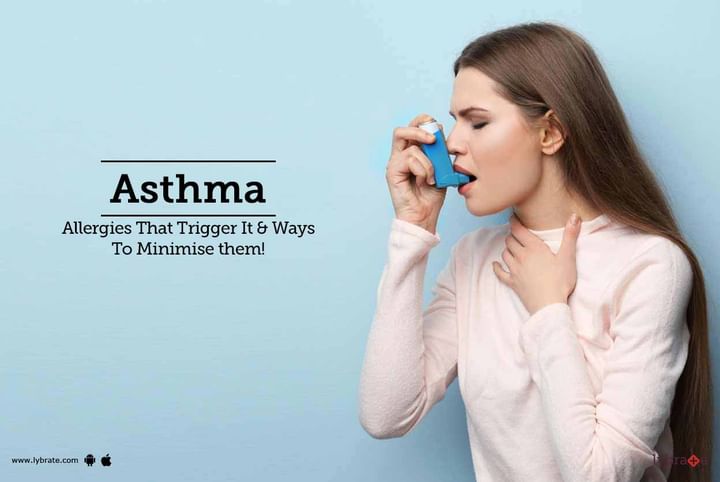Asthma - Allergies That Trigger It & Ways To Minimise them!
If you have been diagnosed with asthma, it is important for you to know about the most common triggers of asthma. Asthma is a medical condition, which is characterised by paroxysmal wheezing respiration dyspnoea. It causes breathing difficulties, tightened chest and coughing. By identifying and reducing your exposure to several asthma triggers, you will be able to manage or control your asthma symptoms and the frequency of your asthma attacks. Here are the most common triggers of asthma you should know about:
Allergies that trigger asthma
Allergies, are common problems and over 80% of people are suffering from asthma and are allergic towards substances like weed pollens, animal dander, dust mites, mould and cockroach particles. Children having large amounts of cockroach droppings in their homes are more likely to develop childhood asthma. Dust exposure may lead to dust mite allergy in asthmatic patients.
Food which triggers asthma
Certain food allergies may lead to isolated asthma, where other symptoms are absent. Patients with food allergies can exhibit asthma as a part of anaphylaxis, which are food induced. The common food items which are associated with allergies include eggs, peanuts, cow milk, soy, fish, wheat, shrimps, salads and fresh fruits. Several food preservatives also trigger asthma. They may include sulfite additives such as potassium bisulfite, potassium metabisulfite, sodiumsulfite, sodium bisulfate and many others. These are commonly used in food processing and trigger asthma in sensitive people.
Asthma induced by exercise
Strenuous exercise may lead to the narrowing of the airways in maximum people having asthma. Exercise acts as a primary trigger for asthma symptoms in many people. Patients having exercise induced asthma are likely to feel chest tightness accompanied by coughing and breathing difficulties after completing an aerobic workout session. Although the symptoms subside, they may reoccur within some hours. You should warm up properly and slowly before a rigorous workout session to prevent an asthma attack.
Smoking
People who smoke are more likely to have asthma. If you have asthma and still smoke, the symptoms of wheezing and coughing worsen. Pregnant women who smoke increase the chance of wheezing in their to-be-born babies. You should absolutely quit smoking if you have asthma.
Infections which trigger asthma
Several infections such as cold, bronchitis, flu and sinus may cause asthma attacks. The respiratory infections, which are viral or bacterial, are a common cause and trigger asthma, especially in children. Asthma is also associated with severe heartburn. According to studies, more than 85% people with asthma also suffer from heartburn. This is a condition known as gastroesophageal reflux disease or GERD.
How to Minimize Asthma Triggers
-
Air out damp, humid areas frequently. Run a dehumidifier to keep humidity between 25% and 50%.
-
Use air conditioners when possible.
-
Clean bathrooms regularly, using products that kill and prevent mold.
-
Use exhaust fans to vent steam.
-
Keep indoor plants out of bedrooms.
-
When painting, add mold inhibitor to paint to prevent mold from growing.
-
Avoid sources of outdoor molds, such as wet leaves or garden debris.
-
To clean visible mold, use a cleaning solution containing bleach and detergent.
-
Limit your outdoor activities during times of high pollen, such as early morning.
-
Stay indoors during humid or windy days when pollen counts are high.
-
Keep windows closed during pollen seasons.
-
Encase pillows and mattresses with allergen-proof, zippered covers.
-
Pillows and bedding should not contain feathers.
-
Wash all bedding in hot water, once a week.
-
Non-carpeted flooring is best. If you cannot get rid of your carpeting, vacuum often with a multi-layer, allergen-proof vacuum bag. Wear a mask while vacuuming. If your child has asthma, do not vacuum while he or she is in the room.
-
Avoid curtains and drapes. Use plain window shades instead of miniblinds. Washable curtains should be washed in hot water every 2 to 4 weeks.
-
Dust all surfaces with a damp cloth often, including lampshades and windowsills.
-
Keep clutter under control. Toys and books should be stored in enclosed bookshelves, drawers or closets.
-
Replace traditional stuffed animals with washable stuffed animals.
-
Keep all clothing in drawers and closets. Keep drawers and closets closed.
-
Cover air ducts with filters. Change these when soiled.
-
Regularly change filters of heaters and air conditioners
-
Long visits to friends and family who own pets should be avoided. If you do visit, make sure you take asthma or allergy medicines before the visit. Exposure to the pets should be kept to a minimum when visiting.
-
If you must have a cat or dog in the home, restrict its living area. It should not be allowed in your bedroom at any time. If possible, keep the pet outside.
-
Wash your pet weekly.
-
Remove as much carpeting as possible. Animal dander deposits in the carpet and stays there, even after the pet has gone from the home.



+1.svg)
